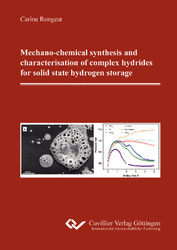| Areas | |
|---|---|
| Serie de libros (96) |
1381
|
| Nachhaltigkeit |
3
|
| Gesundheitswesen |
1
|
| Letra |
2370
|
| Ciencias Naturales |
5408
|
| Ciencias Ingeniería |
1795
|
| Ingeniería | 292 |
| Ingeniería mecánica y de proceso | 862 |
| Ingeniería eléctrica | 688 |
| Mineria y metalurgía | 30 |
| Arquitectura e ingeniería civil | 75 |
| General |
98
|
|
Leitlinien Unfallchirurgie
5. Auflage bestellen |
|
Erweiterte Suche
Mechano-chemical synthesis and characterisation of complex hydrides for solid state hydrogen storage (Tienda española)
Carine Rongeat (Autor)Previo
Indice, Datei (98 KB)
Lectura de prueba, Datei (540 KB)
Hydrogen storage technologies are gaining interest for the development of new sustainable energy carriers instead of fossil fuel and for reducing the release of greenhouse gases. Solid state hydrogen storage in hydrides offers a good alternative for an efficient storage. In particular for mobile applications, a high gravimetric and volumetric storage capacity is necessary. These requirements have triggered a lot of interest for complex hydrides (metal alanates M(AlH4)x or borohydrides M(BH4)x). Here, reactive ball milling under hydrogen pressure has been developed for the synthesis of complex hydrides from their decomposition products. Two different kind of complex hydrides were selected: NaAlH4 as a model system and Ca(BH4)2 for its high hydrogen capacity. Sodium alanate NaAlH4 can store practically ca. 4wt% of hydrogen in the 100-150°C temperature range but this can be achieved only when adding a dopant to NaAlH4. In this work, different metal and metal chloride dopants for NaAlH4 are studied. The comparison of these dopants is used to better understand the catalytic and reaction mechanisms. Nevertheless, despite its good reversibility, NaAlH4 cannot be considered for mobile application because of its limited hydrogen capacity. Therefore, metal borohydrides have been considered more recently due to their high gravimetric and volumetric stored hydrogen densities. Among them, Ca(BH4)2 (11.5wt% H2) is interesting because of the predicted suitable thermodynamic properties. A new synthesis route has been investigated, using reactive ball milling of CaH2 and CaB6 under high hydrogen pressure (max 150 bar). The reversible decomposition/formation of Ca(BH4)2 was observed (60% yield) during cycling and was obtained using TiF3 as additive but cannot be achieved with TiCl3 as additive. The understanding of the difference observed when using these two additives is of crucial importance to further improve the kinetics of H2 sorption and the use of Ca(BH4)2 for hydrogen storage.
| ISBN-10 (Impresion) | 3869556633 |
| ISBN-13 (Impresion) | 9783869556635 |
| ISBN-13 (E-Book) | 9783736936638 |
| Formato | A5 |
| Idioma | Inglés |
| Numero de paginas | 170 |
| Laminacion de la cubierta | Brillante |
| Edicion | 1 Aufl. |
| Volumen | 0 |
| Lugar de publicacion | Göttingen |
| Lugar de la disertacion | TU Dresden |
| Fecha de publicacion | 25.02.2011 |
| Clasificacion simple | Tesis doctoral |
| Area |
Ingeniería
|








